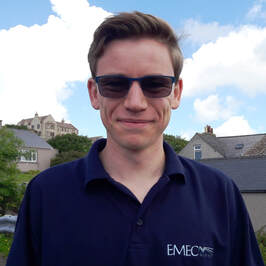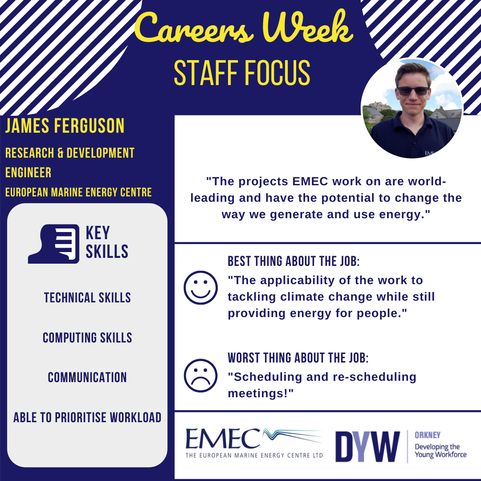 Now we hear from James Ferguson, who is a Research and Development Engineer with EMEC. James studied Chemical Engineering in an integrated Honours-Masters programme at the University of Edinburgh. After taking some time out to travel, he then began his Doctorate, working with EMEC on their hydrogen project. After he completed his Thesis, he was offered a job with EMEC.  Can you describe a typical day in your job? It usually involves lots of emails! I also can attend conferences and hear about the technology and projects that people are working on, as well as present what my company, EMEC, has learned. Reading and writing reports is another important task, whether it is from international organisations outlining how our energy generation and use could change over the coming decades, or whether we are focusing on our tidal energy test site on Eday. We are working to establish research and development objectives – having outlined everything that we could do, we are now working to narrow this down to what we should do! That will help us to make the biggest strides in advancing these new technologies. How did you end up in this role? One of my uncles suggested surveying, so I decided to do that. Then another uncle suggested chemical engineering, so I did that instead! My maths and chemistry course come in helpful whilst studying for five years in an integrated Honour /Master’s program at the University of Edinburgh (Honours and Masters are different academic qualifications.) This included a six-month placement at a wastewater treatment works at Diageo, a company which produces Johnny Walker whiskey and other famous beers and spirits. After this, I took some time out to travel, including cycling from Banff, Canada, to the US border with Mexico, along the Rocky Mountains. During this time, I applied for lots of different jobs, including an Industrial Doctorate program in Offshore Renewable Energy (a Doctorate is another academic qualification.) I was successful, so 15 months after I graduated, I headed to Edinburgh to spend a year in a quick fire Masters-type program, before moving to Orkney to spend three years working within EMEC on hydrogen. Hydrogen can be made by using electricity to split water into hydrogen and oxygen. The hydrogen can then be used in the same way as any other fuel. I wrote a long document, called a Thesis, on how much hydrogen EMEC could produce, and at what cost, and looked at the machines capacities which gave the best hydrogen cost. After all that, EMEC offered me a job! What is the best thing about your job? The applicability of the work to tackling climate change while still providing energy for people. The projects EMEC works on are world leading and have the potential to change the way we generate and use energy. What is the worst thing about your job? Scheduling and re-scheduling meetings! What skills do you need to undertake your role? Lots of technical skills, such as calculations and using computer programs in which those calculations can be carried out. Also, skills in communication, to ensure that priorities, actions and constraints are understood. What qualifications do you have? Master of Engineering (MEng) and Honours in Chemical Engineering Engineering Doctorate (EngD) Would you recommend this job to young people, if so why? Yes, because it can help tackle climate change while still providing energy that people need. Visit EMEC on: Website: www.emec.org.uk Facebook: www.facebook.com/EuropeanMarineEnergyCentre Twitter: www.twitter.com/EMEC_Ltd Comments are closed.
|
Archives
June 2024
Categories
All
|
 RSS Feed
RSS Feed